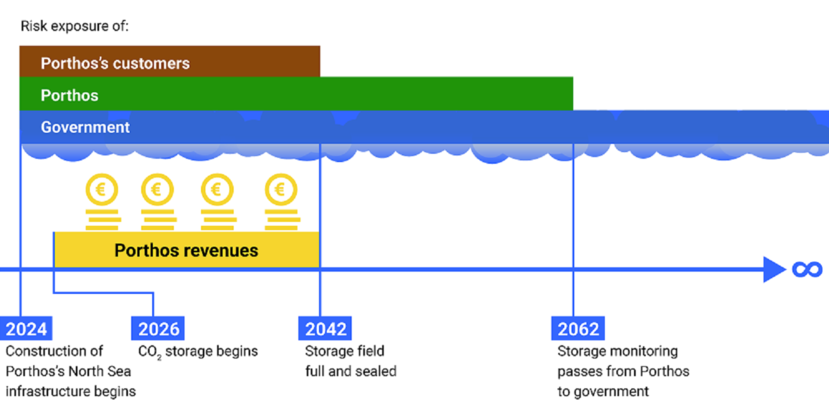If CO2 prices go up, industry benefits most from Porthos’s carbon storage under the North Sea
CCS project investigated: long-term risks lie with the State
Carbon dioxide captured by industrial companies and pumped through a pipeline from Rotterdam to a depleted natural gas field under the North Sea is expected to make a significant contribution to the Netherlands’ climate goal for 2023. An audit by the Netherlands Court of Audit concludes that the Porthos project will be an effective instrument in the government’s climate policy. Calculations show that Porthos’s industrial customers will benefit most from higher CO2 prices, whereas the government should do better for itself.
Only the government bears the never-ending risks of carbon storage under the sea but it does not share proportionally in the benefits

The Court of Audit has investigated the project even though Porthos itself does not yet exist. The government intends to roll out more carbon capture and storage (CCS) projects as part of its climate policy. The audit report published on 28 March 2024 indicates that the ministers concerned should have paid more attention in advance to the allocation of this innovative project’s risks and benefits. Three state-owned enterprises, EBN, Gasunie and the Port of Rotterdam, are investing billions of euros in the project. Its customers are Dutch subsidiaries of British, American and French multinationals: Shell, Air Products, ExxonMobil and Air Liquide. The State of the Netherlands is also providing financial support for the project, the first large-scale, undersea carbon storage project.
Risks to the government indirectly during the project and directly after 2062
The state-owned enterprises will start building the infrastructure for this CCS project this year. Porthos will start pumping the CO2 into a depleted natural gas field under the North Sea in 2026. Setbacks will have indirect consequences for the government, as the state-owned enterprises will lower their dividend payments to it. The field will be filled and sealed in 2042. The customers will then no longer need to pay for the storage. Porthos will remain responsible for the field until 2062. The government will then assume responsibility for monitoring the field and for any costs due to CO2 leakages.
Government provides less funding but should do better for itself
The Porthos project’s carbon storage is efficient for the government because the grants it will award are less than the standard of €300 per tonne of CO2 avoided. The Minister for Climate and Energy has undertaken to award grants of up to €2.1 billion.
Calculations by the Court show that large-scale carbon storage under the North Sea is expected to be more economical for the government than ministers had foreseen. The higher the CO2 price, the lower the grants it will award to industry. The companies, however, will benefit far more than the government because they will need to surrender fewer EU emission allowances. They will emit less CO2 and the cost of the allowances is projected to rise. The return on the customers’ investment can rise to as much as 34%. The government will not share proportionally in the higher revenues, even though the grant conditions and the Mining Act could have allowed it to do so. In view of the government’s long-term risk exposure, it is selling itself short. The Netherlands can apply the lessons learned from the Porthos project in future CCS projects.
The return projected for the state-owned enterprises that run the project will be lower. It will fall far short of their target return of 6.6%, partly because of delays and unforeseen costs.
Parliament not informed of residual gas or additional costs
The House of Representatives had assumed that the gas field selected for CO2 storage was empty or exhausted. But this was not the case. There is still a residual amount of gas in the field. With gas prices rising, the owner of the field must be compensated. This unforeseen cost will be shared by Porthos and its 4 industrial customers. They will pay the field’s current operator tens of millions of euros in compensation. This agreement was a condition set by the Minister for Climate and Energy as part of a guarantee scheme. The minister die not inform the House of this agreement or of the additional costs when he agreed to a guarantee scheme for Porthos.
Response of the minister and the Court of Audit’s afterword
The Court of Audit has made several recommendations. One of them concerns state-owned EBN’s participation in Porthos. It is uncertain whether CCS hinders EBN’s performance of its core oil and gas production task. In response, the 3 ministers and the state secretary concerned will assess EBN’s statutory tasks. The ministers will also study how the government can benefit more from CCS projects. They note that Porthos is the first large-scale project to store CO2 under the sea and the government is encouraging industry to reduce carbon emissions in order to meet its climate goals.
In the Court of Audit’s opinion, future CCS projects should pay more attention to a fairer allocation of risks and benefits.